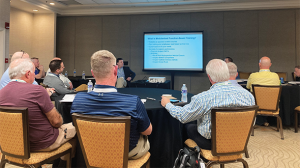PERC: Accreditation promises to overhaul safety programming
The Propane Education & Research Council (PERC) held its 2023 National Propane Education & Training Conference in Orlando, Florida. PERC leaders related the organization’s top priorities for its safety programming and explained how safety and training professionals play a critical role in supporting the industry’s wider interests.

Attendees of PERC’s National Propane Education & Training Conference learned the latest about safety training methods and best practices. (Photo by LP Gas staff)
In the presentations and breakout sessions, attendees were encouraged to:
Prepare for change: PERC is seeking third-party accreditation for its safety and training programs in 2023-24.
Accreditation assures quality programming and raises confidence among regulators, according to Eric Kuster, PERC’s senior vice president of safety, education and compliance.
It also allows for issuance of continuing education credits (CEUs) that establish a professional licensing standard and make it possible to reach other industries like plumbing and HVAC with the propane curriculum.
PERC submitted its application for accreditation to International Accreditors for Continuing Education and Training (IACET) early this year. PERC aims to achieve accreditation by the end of 2023 and will seek accreditation for its instructor-led programming by the end of 2024. Accreditation for instructor-led programming means instructors will have to meet certain standards to deliver accredited materials.
Certified Employee Training Program (CETP) materials will not meet the accreditation standard and will be replaced with new materials over time, says Kuster. While CETP will remain in place for now, the need for that program will diminish as new accreditation standards are established.
Embrace new tools: PERC is pursuing a virtual reality (VR) pilot program to enhance the industry’s safety and training material. Professionals who attended the conference had the opportunity to demo a VR safety module developed by NextWave Safety Solutions, PERC’s partner on the pilot.
According to Daniel Stein, director of client solutions at NextWave, VR safety programs offer a number of benefits for students and instructors, including increased engagement with and receptiveness toward classroom materials, as well as improved test scores and better preparedness for the job.
Develop the workforce: The propane industry’s safety and training experts are uniquely positioned not only to convey key safety information but to define career paths for prospective employees through education and training programs.
Bridget Kidd, senior vice president of industry relations at PERC, emphasized the importance of building relationships with local technical schools and allied partners in other industries.
Spread and defend propane’s environmental message: Propane professionals may notice that customers and employees are asking more questions about propane’s safety following national media coverage of a Stanford study that links gas stoves to childhood asthma.
Safety professionals can help ensure field employees, who are most likely to interface with customers on a daily basis, understand the facts about propane and can respond to customers’ questions. Training professionals also have a platform to reach young prospects and trainees.
“We want to be sure kids and young adults aren’t deterred by this media coverage,” says Kidd.
Check out the “Setting the record straight” section of PERC’s website, where it seeks to address and correct within 48 hours what it views as faulty media coverage.
“We’d love to see you incorporate some of this messaging in the training you’re doing,” says Kidd.
















